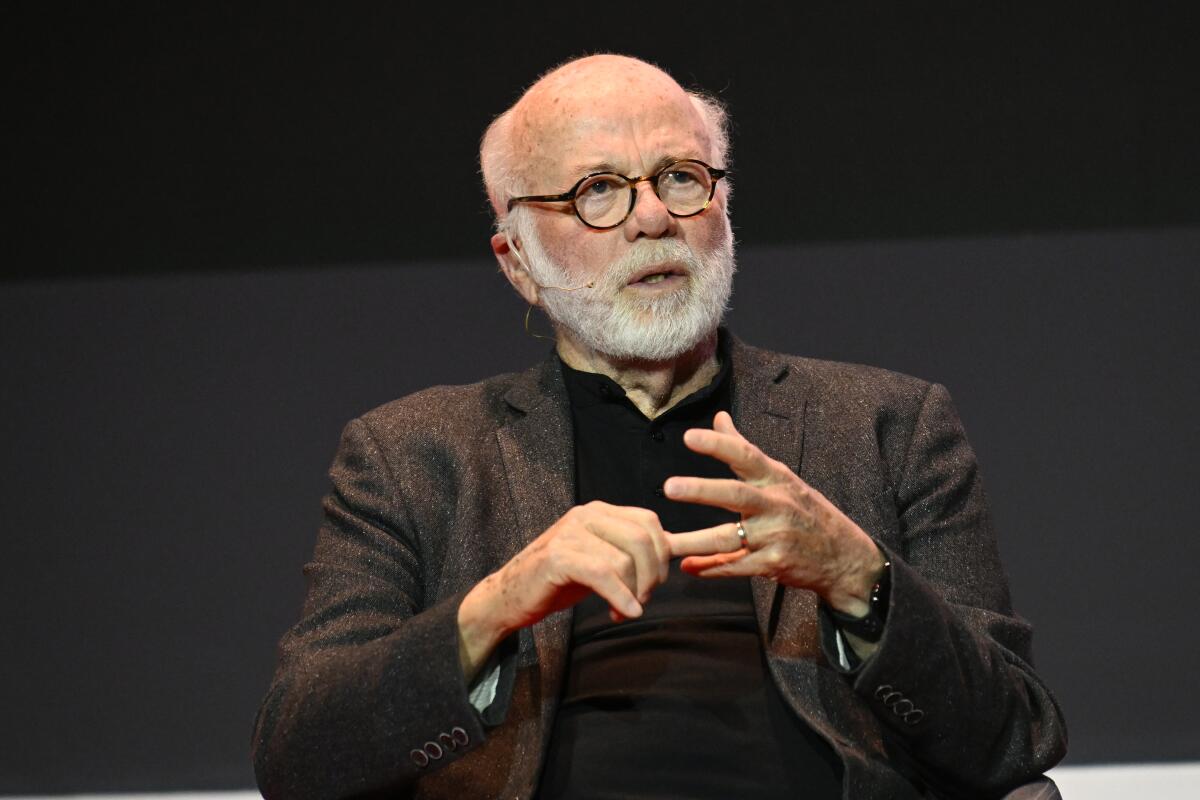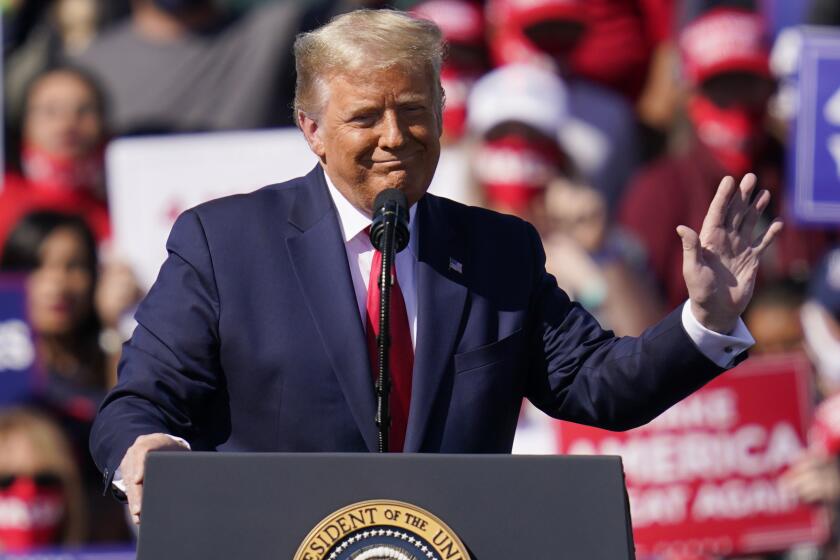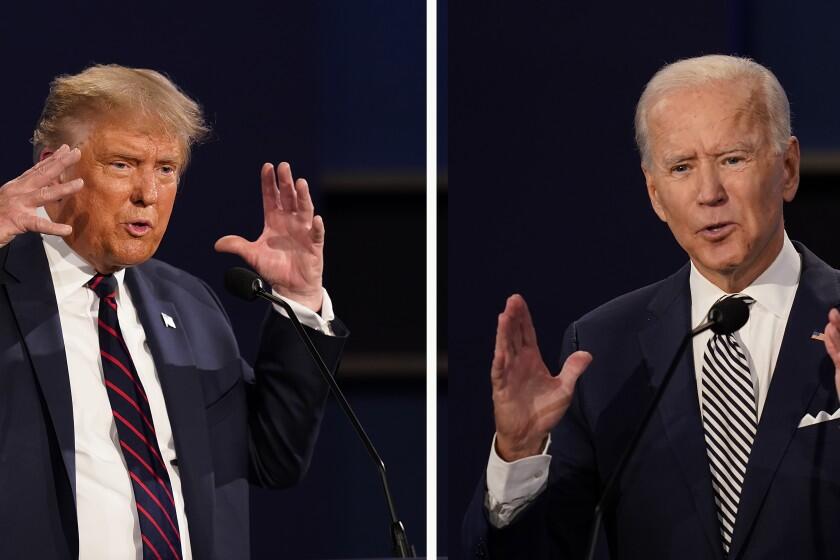Column: Presidential foundation was too scared to honor Liz Cheney, so he quit in disgust

- Share via
Every year, the Gerald R. Ford Presidential Foundation bestows an award meant to honor acts of political courage. The criteria include strength of character, sound judgment, decisiveness (“particularly during periods of crisis”) and determination “in the face of adversity.”
David Hume Kennerly, a member of the foundation’s board, had in mind the perfect candidate: Liz Cheney.
The former Wyoming lawmaker sacrificed her political career and was effectively excommunicated from the Republican Party for defying then-President Trump and helping oversee the congressional probe into the Jan. 6, 2021, insurrection, as well as Trump’s treacherous attempts to overturn the 2020 election.
“There was only one human on the planet who should have been getting that award,” Kennerly, who served as White House photographer during the Ford administration, said in an interview. “She checked every box.”
But the foundation’s executive committee ignored Kennerly’s recommendation and passed over Cheney — even after others declined the award — citing concerns that she was a possible 2024 presidential candidate and her selection might imperil the group’s tax-exempt status.
It’s a fig leaf so thin the merest whisper of a breeze wafts it away.
In truth, Kennerly said, the executive board feared retribution from the vengeful Trump should he return to the White House. Earlier this week, he resigned his board membership in protest.
Instead of deflecting, Trump’s move places his political fate in the hands of judges and state lawmakers willing to go far beyond where most voters stand.
“If the foundation that bears the name of Gerald R. Ford won’t stand up to this real threat to our democracy, who will?” Kennerly said in a five-page letter to the executive committee.
(Ford’s singular act of political courage was pardoning former President Nixon, hastening the country’s healing from the Watergate scandal though it quite possibly cost Ford the closely fought 1976 presidential election.)
“I can’t in good conscience stay on the board of an organization representing Gerald R. Ford that doesn’t manifest his kind of guts,” said Kennerly, who was personally close to the late president and his wife, Betty. “It’s now a place whose leadership is cowed by a demagogue creating and promulgating the greatest crisis our country has faced since the Civil War.”
Kennerly elaborated in the interview. His resignation was intended as a quiet act of protest, he said from his home in Los Angeles. But it became public almost immediately when someone — not he — leaked the letter to Politico.
“Any time you put something out there ... ,” Kennerly said, his voice trailing off. The Pulitzer Prize-winning photographer has spent decades in and around politics, so he’s “not naive,” he said.
During a half-hour conversation, Kennerly toggled between anger — “chickens—,” he called the board’s snub of Cheney — and concern that his actions not be misconstrued.
“This is not an easy thing. I don’t want this to appear to be dropping a B-52 strike on the Ford Foundation,” said Kennerly, whose searing images of the Vietnam War have become an indelible part of America’s historical record. “It’s more about the fear factor facing people in our country now. People are afraid to step up, and you can thank the former president for that.”
Kennerly’s protest, heartfelt as it may be, could easily be dismissed as the griping of someone who simply didn’t get his way. He described Cheney as one of his best friends and he is also close to her family.
But as someone steeped in history, who has witnessed politicians up close and cataloged courage and human failings in a way few have, Kennerly’s observations are worth noting.
The foundation board has dozens of trustees — Cheney among them — who offer nominations to a 12-member executive committee, which has the final say on each year’s winner of the Ford Medal for Distinguished Public Service.
Kennerly first recommended Cheney for the award last fall. The executive board chose someone else — even though it was abundantly clear Cheney, who had been mentioned as a possible stop-Trump candidate, was not running for president.
That should have eliminated those putative concerns about the group’s tax status.
When that individual, and then another, turned down the award, Kennerly again recommended Cheney. (He would not say who else was chosen or why they’d declined the honor.)
Instead, the executive board selected Indiana’s former governor, Mitch Daniels, and Kennerly quit soon after. (No knock on Daniels, he said.)
After Kennerly’s resignation became public, the executive director of the Ford Presidential Foundation, Gleaves Whitney, issued a statement citing fiduciary responsibility, tax issues, legal risk, blah blah, blah.
Those matters were apparently not a concern in 2004 when Dick Cheney, Liz’s father, received the Ford medal. At the time, he was running for reelection as vice president.
Upon further reflection — and after a day of scathingly negative publicity — Whitney issued a follow-up statement Wednesday night.
Liz Cheney, he said, “meets all the criteria the Ford Presidential Foundation medal signifies — courage, integrity, and passion to serve the American people.”
“The Foundation’s decision … is not a reflection on her but on the law governing nonprofits,” Whitney said. “The Foundation’s action this year in no way precludes her from serious consideration to receive the medal in a future year.”
Kennerly’s response was curt: “Total cop-out.”
The ex-president tends to think aloud and let us in on his deliberations. But his choice of a vice presidential running mate remains a mystery, like Kennedy’s path to victory.
So as it stands, Cheney — with all those criteria going for her — maybe someday, after serious consideration, will be recognized with the Ford Medal for the vitally important service she rendered the country by exposing Trump and his mutinous acts.
At no small personal cost, it should be said.
For now, however, leaders of the foundation lack the courage to honor Cheney for performing her sterling act of courage.
It would be funny if it weren’t so pathetic.
More to Read
Get the latest from Mark Z. Barabak
Focusing on politics out West, from the Golden Gate to the U.S. Capitol.
You may occasionally receive promotional content from the Los Angeles Times.













